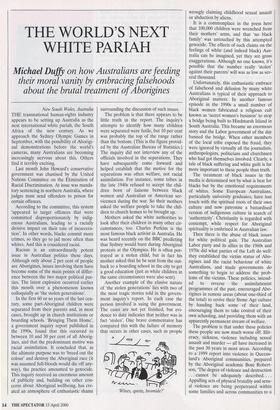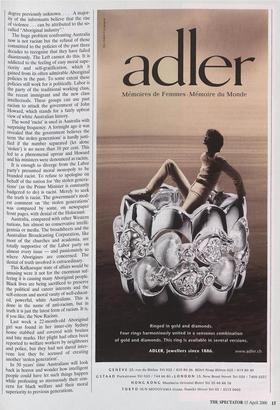THE WORLD'S NEXT WHITE PARIAH
Michael Duffy on how Australians are feeding
their moral vanity by embracing falsehoods about the brutal treatment of Aborigines
New South Wales, Australia THE transnational human-rights industry appears to be setting up Australia as the next international white pariah, the South Africa of the new century. As we approach the Sydney Olympic Games in September, with the possibility of Aborigi- nal demonstrations before the world's cameras, many Australians are becoming increasingly nervous about this. Others find it terribly exciting.
Last month John Howard's conservative government was chastised by the United Nations Committee on the Elimination of Racial Discrimination. At issue was manda- tory sentencing in northern Australia, where judges must send offenders to prison for certain offences.
According to the committee, this system 'appeared to target offences that were committed disproportionately by indig- enous Australians, leading to a racially divisive impact on their rate of incarcera- tion'. In other words, blacks commit more crimes, so they go to jail more often than whites. And this is considered racist.
Racism is an extraordinarily potent issue in Australian politics these days. Although only about 2 per cent of people are Aborigines, issues involving them have become some of the main points of differ- ence between the two major political par- ties. The latest explosion occurred earlier this month over a phenomenon known colloquially as 'the stolen generations'.
In the first 60 or so years of the last cen- tury, some part-Aboriginal children were separated from their parents and, in most cases, brought up in church institutions or boarding schools. 'Bringing Them Home', a government inquiry report published in the 1990s, found that this occurred to between 10 and 30 per cent of all Aborig- ines, and that the predominant motive was racial assimilation. It concluded that, as the ultimate purpose was to `breed out the colour' and destroy the Aboriginal race (it was assumed full-bloods would die off any- way), the practice amounted to genocide. This inquiry received an enormous amount of publicity and, building on other con- cerns about Aboriginal wellbeing, has cre- ated an atmosphere of enthusiastic shame surrounding the discussion of such issues.
The problem is that there appears to be little truth in the report. The inquiry's attempts to identify how many children were separated were futile, but 10 per cent was probably the top of the range rather than the bottom. (This is the figure provid- ed by the Australian Bureau of Statistics.) The inquiry did not interview any of the officials involved in the separations. They have subsequently come forward and helped establish that the motive for the separations was often welfare, not racial assimilation. For instance, some tribes in the late 1940s refused to accept the chil- dren born of liaisons between black women and Australian or American ser- vicemen during the war. So their mothers asked the welfare people to take the chil- dren to church homes to be brought up.
Mothers asked the white authorities to look after their children in many other cir- cumstances, too. Charles Perkins is the most famous black activist in Australia. He was heard recently on the BBC predicting that Sydney would burn during Aboriginal protests at the Olympics. He is often por- trayed as a stolen child, but in fact his mother asked that he be sent from the out- back to a boarding school in the city to get a good education (just as white children in the same circumstances were also sent).
Another example of the elusive nature of 'the stolen generations' lies with two of the most tragic stories told in the govern- ment inquiry's report. In each case the person involved is suing the government. The cases are not yet finished, but evi- dence to date indicates that neither was in fact 'stolen'. One brave commentator has Compared this with the failure of memory that occurs in other cases, such as people 'Wines, spirits, bromide?' wrongly claiming childhood sexual assault or abduction by aliens.
It is a commonplace in the press here that 100,000 children were wrenched from their mothers' arms, and that `no black family' was untouched by this attempted genocide. The effects of such claims on the feelings of white (and indeed black) Aus- tralia can be imagined, yet they are gross exaggerations. Although no one knows, it's possible that the number really 'stolen' against their parents' will was as low as sev- eral thousand.
Unfortunately, this enthusiastic embrace of falsehood and delusion by many white Australians is typical of their approach to Aboriginal matters. In another famous episode in the 1990s a small number of black women fabricated a religious cult known as 'secret women's business' to stop a bridge being built to Hindmarsh Island in South Australia. This became an enormous story and the Labor government of the day banned the bridge. When other members of the local tribe exposed the fraud, they were ignored by virtually all the journalists, anthropologists, politicians and churchmen who had got themselves involved. Clearly, a tale of black suffering and white guilt is far more important to these people than truth.
The treatment of black issues in the media is determined not by what is best for blacks but by the emotional requirements of whites. Some European Australians, particularly university graduates, have lost touch with the spiritual roots of their own culture and now patronise a bastardised version of indigenous culture in search of 'authenticity'. Christianity is regarded with contempt, while respect for Aboriginal spirituality is enshrined in Australian law.
Then there is the abuse of black issues for white political gain. The Australian Labor party and its allies in the 1960s and 1970s did what parties of the Left do well: they established the victim status of Abo- rigines and the racist behaviour of white Australians, and made governments do something to begin to address the prob- lems of the victims. These policies, intend- ed to reverse the assimilationist programmes of the past, encouraged Abo- rigines in remote areas (about one-third of the total) to revive their Stone Age culture by handing back some of their land, encouraging them to take control of their own schooling, and providing them with an apparently permanent stream of welfare.
The problem is that under these policies these people are now much worse off. Illit- eracy, sickness, violence including sexual assault and murder — all have increased in the past 30 years in most areas. According to a 1999 report into violence in Queens- land's Aboriginal communities, prepared by the Aboriginal academic Boni Robert- son, The degree of violence and destruction . . . cannot be adequately described. Appalling acts of physical brutality and sexu- al violence are being perpetrated within some families and across communities to a degree previously unknown. . . . A major- ity of the informants believe that the rise of violence . . . can be attributed to the so- called "Aboriginal industry"! The huge problem confronting Australia nOW is not racism but the refusal of those committed to the policies of the past three decades to recognise that they have failed disastrously. The Left cannot do this. It is addicted to the feeling of easy moral supe- riority and self-gratification, which it gamed from its often admirable Aboriginal Policies in the past. To some extent these pohcies still work for it politically. Labor is the party of the traditional working class, the recent immigrant and the new class intellectuals. These groups can use past racism to attack the government of John Howard, which stands for a fairly upbeat view of white Australian history.
The word 'racist' is used in Australia with surprising frequency. A fortnight ago it was revealed that the government believes the term 'the stolen generations' is hardly justi- fied if the number separated (let alone stolen') is no more than 10 per cent. This led to a phenomenal uproar and Howard and his ministers were denounced as racists.
It is enough to diverge from the Labor party's presumed moral monopoly to be branded racist. To refuse to apologise on behalf of the nation for 'the stolen genera- tions' (as the Prime Minister is constantly badgered to do) is racist. Merely to seek the truth is racist. The government's mod- est comment on 'the stolen generations' was compared by some, on newspaper front pages, with denial of the Holocaust. Australia, compared with other Western nations, has almost no conservative intelli- gentsia or media. The broadsheets and the Australian Broadcasting Corporation, like most of the churches and academia, are totally supportive of the Labor party on almost every issue — and passionately so Where Aborigines are concerned. The denial of truth involved is extraordinary. This Kafkaesque state of affairs would be amusing were it not for the enormous suf- fering it is causing many Aboriginal people. Black lives are being sacrificed to preserve the political and career interests and the self-esteem and moral vanity of well-educat- ed, powerful, white Australians. This is done in the name of anti-racism, but in truth it is just the latest form of racism. It is, if you like, the New Racism. Last week a 22-month-old Aboriginal girl was found in her inner-city Sydney home stabbed and covered with bruises and bite marks. Her plight had often been reported to welfare workers by neighbours and police, but they had not dared inter- vene lest they be accused of creating another 'stolen generation'. In 50 years' time Australians will look back in horror and wonder how intelligent people could have let such things happen while professing so strenuously their con- cern for black welfare and their moral superiority to previous generations.



































































 Previous page
Previous page